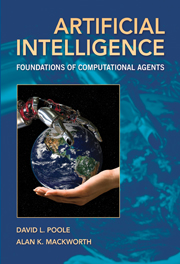Book contents
- Frontmatter
- Contents
- Preface
- I Agents in the World: What Are Agents and How Can They Be Built?
- II Representing and Reasoning
- III Learning and Planning
- IV Reasoning About Individuals and Relations
- 12 Individuals and Relations
- 13 Ontologies and Knowledge-Based Systems
- 14 Relational Planning, Learning, and Probabilistic Reasoning
- V The Big Picture
- A Mathematical Preliminaries and Notation
- Bibliography
- Index
14 - Relational Planning, Learning, and Probabilistic Reasoning
from IV - Reasoning About Individuals and Relations
- Frontmatter
- Contents
- Preface
- I Agents in the World: What Are Agents and How Can They Be Built?
- II Representing and Reasoning
- III Learning and Planning
- IV Reasoning About Individuals and Relations
- 12 Individuals and Relations
- 13 Ontologies and Knowledge-Based Systems
- 14 Relational Planning, Learning, and Probabilistic Reasoning
- V The Big Picture
- A Mathematical Preliminaries and Notation
- Bibliography
- Index
Summary
What is now required is to give the greatest possible development to mathematical logic, to allow to the full the importance of relations, and then to found upon this secure basis a new philosophical logic, which may hope to borrow some of the exactitude and certainty of its mathematical foundation. If this can be successfully accomplished, there is every reason to hope that the near future will be as great an epoch in pure philosophy as the immediate past has been in the principles of mathematics. Great triumphs inspire great hopes; and pure thought may achieve, within our generation, such results as will place our time, in this respect, on a level with the greatest age of Greece.
–Bertrand Russell [1917]The representation scheme dimension (page 20) has, as its top level, reasoning in terms of individuals and relations. Reasoning in terms of relations allows for compact representations that can be built before the agent encounters particular individuals. When an agent is introduced to a new individual, it can infer relationships about that individual. This chapter outlines how, in three areas of AI, feature-based representations are expandable to (also) deal with individuals and relations. In each of these areas, the relational representation benefits from being able to be built before the individuals are known and, therefore, before the features are known. As Russell points out in the quote above, relational reasoning brings great advantages over propositional (and feature-based) representations.
Information
- Type
- Chapter
- Information
- Artificial IntelligenceFoundations of Computational Agents, pp. 597 - 622Publisher: Cambridge University PressPrint publication year: 2010
